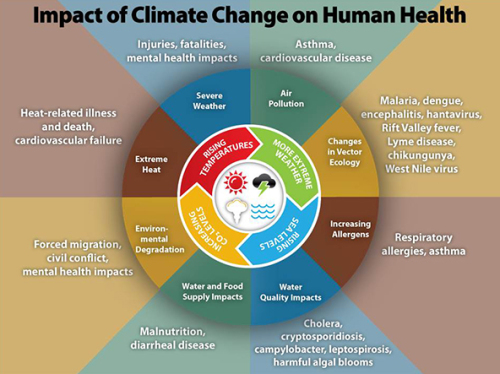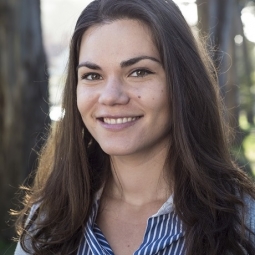The Growing Link Between Climate Change and Public Health
Publication Date
Story/Content
At the Institute, we look at health inequity and climate change as imperative social issues, particularly now that mounding research is illustrating how the two are inextricably linked. Specifically, we create and join conversations where taking action includes viewing parks as part of the solution to these issues. Community health inequities and climate change are problems that affect societies on a collective scale. That is to say, the actions of a single individual are not necessarily the root of the cause, but the collective actions of many individuals can be. For example, one group may decide to close a grocery store in an underserved neighborhood or another group may open a coal mine, leading to food deserts and expanded fossil fuel emissions, respectively.
The individual scale on which most people operate creates a powerful psychological barrier to acknowledging the realities of climate change and health inequities. Climate change in particular is still perceived by some as a distant threat that is not directly relevant to existing communities, even despite the fact that a majority of Americans believe global warming is happening. Spurred by the misinformation campaign against the realities of climate change, this mentality of “not here, not now, not me” is quite tempting to adopt. However, illustrating the connection between climate change and health inequities is one powerful tool to make this issue more tangible and resonate with more Americans, without the political polarization which often arises in discussions of climate change as such.
There is robust research illustrating the connection between these two issues, ranging from the severe effects of extreme heat exposure, leading to preventable heat-related injuries and deaths, to increased levels of asthma and other respiratory illnesses as a result of air pollution made worse by climate change. These impacts are already being felt locally, nationally, and globally.
• Between 1999 and 2009, extreme heat exposure caused more than 7,800 deaths in the United States.
• In California, we are facing a first-ever statewide executive order for water reductions in order to combat the current drought likely resulting from climate change.
The infographic below illustrates the vast impacts that a warming climate can have on communities. The effects of climate change on health are far-reaching, effecting people living in rural, woodland areas, where they are more at-risk for wildfires, as well as urban populations that are disproportionately affected by heat-island effect. Particularly vulnerable groups include young children, the elderly, people with chronic medical conditions, and people of low-income.

While these impacts are pervasive, and perhaps daunting, people ranging from grassroots organizers to President Obama are discussing the connectivity of these issues with renewed vigor and taking action. At the Institute, we believe parks are problem solvers that provide unique solutions to the greatest issues, including the health impacts of climate change. Parks, especially urban parks, offer a number of ways to combat the effects of higher temperatures exacerbated by heat island effect. They temper high temperatures through shading and evapotranspiration, improve wind patterns in cities via park breezes, moderate precipitation events, and trap carbon in addition to other pollutants that adversely affect the ozone. Parks are also incredibly effective classrooms, acting as neutral venues to discuss—and witness—the effects of climate change. Additionally, parks are well-documented for having far-reaching physical, psychological, and mental health benefits.
When confronted daily by the immense challenges facing our environment and our public health, advocates for these issues are sometimes tempted to despair. At the same time, simple and tested policy solutions like parks tend to be overlooked in the political discourse surrounding climate change. As Occam’s razor would have it, though, the simplest answer can often be the right one. As part of a comprehensive program for addressing climate change, parks are the practical and scalable seed of environmental advocacy, ready to be nurtured in every community.



